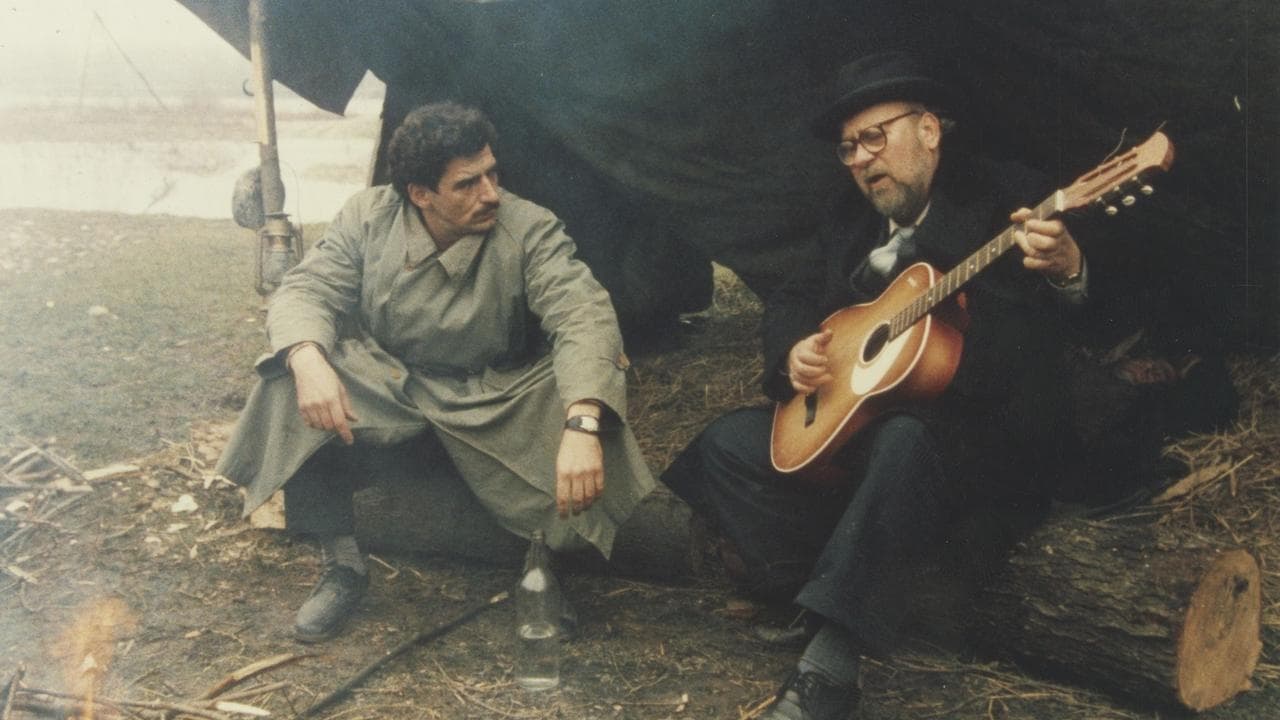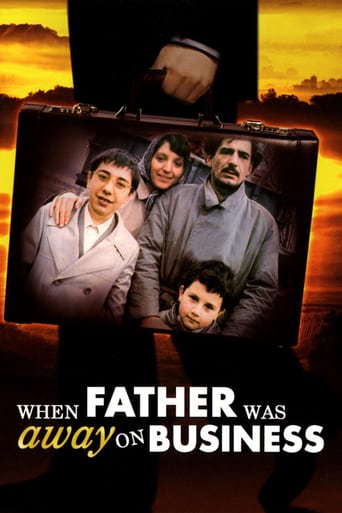ElMaruecan82
Reading some of his interviews, I'm not surprised that Emir Kusturica, one of the greatest European directors, despised political movies. Some directors use their movies to make a commentary, which is fine as long as the story allows the viewers to extract the 'political' substance by themselves. Have you noticed that everything is political today? From the movies to their awards campaign, everything revolves around issues such as race, gender or resulting discrimination, and that trend might inspire some filmmakers to try to have a shot by making something 'relevant' instead of something that speak to them. Today, no one should ever be allowed to be personal about himself unless it's for some political statement likely to inspire claps, cheers and nods. There's nothing wrong with being unpopular but with all the media outrage frenzy of our twitter-driven era, you're only unpopular when you're ostracized, and your detractors can cut off your capacity to reach people.That's why Kusturica could have never made movies for Hollywood, or under the studio system. That's why, out of all the directors who tell political stories, Kusturica can make the most politically rich movies without being prisoner of one ideological perception. His Golden Palm winning "Underground" could be regarded as a magnificent and epic retrospective of the history of ex-Yugoslavia, but the film is also a vibrant, exuberant and musically driven orgy of booze, sex and passion that says more about the soul of the Balkans than any other thing. Kusturica speaks from the heart and portray characters who generally care about regimes and ideologies in the realm of their personal greed or lust, they're strong but weak, big guys acting like children. So much for political engagement.And it also seems that Kustrucia, more than any other else, knows one thing or two about human hubris. One of my regrets was to have discovered "Undeground" before Fellini's movies and couldn't spot the connection when I finally discovered the Maestro. Now, I can fix it and say that maybe Kusturica is the most Fellinian director but he's like Fellini with a social commentary, maybe the neo-realisitic Fellini and it shows even more in his first Golden Palm winner "When Father Was Away on Business" (Kusturica is one of the few directors to have won the Palm twice), the story whose euphemistic title doesn't prepare for how sad it is, how dramatic and yet comedic and catching at others. Forgive for the cliché, but "like life I guess".The film takes place in Sarajevo, in 1950, at the midst of the Stalin Tito Split, the DVD bonus features provide many information, they are so helpful I'd recommend to check them first. In fact, there's an irony in the history of Yugoslavia, the people were proud to fight the Nazis, they didn't totally surrender to Stalin's hegemony, wanting to be treated as an equal, much to the Soviet Master's anger. The film contains many football games between the two countries and you can tell that Yugoslavians are taking their victories damn seriously. The film was made the same year than the Heysel tragedy, just to remind that the setting of the film never deprives from its timeless and universal value. Still, what a tragic irony that this pride was a double-edged sword leading Yugoslavian multiculturalism to cause its downfall.The Split lead to the formation of a bureau named Informibrio and whose mission was to spot any potential agent of the Soviet or someone malcontent enough to become a troublemaker. It's a sort of Yugoslavian "HUAC" with the same paranoid implications. But Kusturica doesn't shout it clear and loud, he only starts his film with a man singing "Chiquita", that he picked a Mexican song instead of an American or Russian one implicitly tells you the kind of attitudes that can get you in trouble. But sometimes, it can be worse than singing. The pivotal moment occurs when Mesa, a communist functionary played by Miki Manojlovic (he was the unforgettable Marco in "Underground") criticizes a cartoon in newspaper "Politika". Mesa just state something like "they're really going too far", and the comment wouldn't have taken him too far if it wasn't for his mistress to hear him. Hurt after because he can' divorce from his wife, lshe denounces him to his brother-in-law and it's a matter of a few days to get him arrested and go "far away on business". Then starts a series of life episode involving his patient and enduring wife Mirjana Karanovic (also starring in "Underground") and the two boys, a geeky photography buff played by the late Davor Dujmovic, and a chubby kid Mario De Bartolli, he's the narrator and the film is punctuated with many episodes involving his sleepwalking."When Father Was Away on Business" is both a family drama and a touching coming-of-age story that never overplays the pathos or the lyricism. Sarajevo is a town where four religions meet, Kusturica makes the same point by showing a Muslim family, practicing circumcision rituals, an orthodox funeral and people of different backgrounds drinking and dancing together. As if he was sleepwalking during his own journey, Kusturica says the most without saying much, knowing that you're never as touched by a politican story when you can't touch its political content. The film could have been set anywhere, anytime, it doesn't say much about the regime, only the ongoing paranoia when every word can cause your downfall.And before you consider yourself luck not to have to endure this, remember that, at the midst of the metoo movement, an actor like Damon suffered severe backlash for a comment he made. And how many actors now are "away on business" because of an accusation or a suspicion. Sorry to make these interfere with the movie but while I expected a 1980's drama that would have aged a little, I didn't expect a film to be so relevant.
Michael Neumann
The background may be confusing to viewers unfamiliar with post-WWII Balkan history, but this was never (thankfully) meant to be a big-screen social studies lesson. The film is a sentimental (but never mawkish) drama of family life behind the Iron Curtain, as seen through the often glazed eyes of an eight-year old Yugoslav boy (prone to episodes of somnambulism) whose father is arrested for making a casual criticism of an editorial cartoon. Rather than taking potshots at easy political targets, director Emir Kusterica focuses instead on smaller, more intimate conflicts, recounting moments of family affection and bitterness with an understated humor transcending national and cultural borders.
Bob Taylor
I was very impressed with When Father was Away on Business; it is more coherent and moving than Black Cat, White cat, which I saw last week. The family structure is very well evoked, with three generations living in the house. The grandfather just wants to be left out of politics--for him Hitler and Stalin are pretty much the same. Mesa and Sena, the couple doomed to be separated for two years, are up to their ears in party machinations. Zijo, the brother in law, has sent Mesa to the mines for re-education, because his soon-to-be wife Ankica denounced the feckless Mesa when he wouldn't divorce Sena to marry her. In a totalitarian state, a lot depends on not annoying your relatives.Miki Manojlovic is great as Mesa; he reminds me of Raimu occasionally. The wedding scene, when he effects a reconciliation with Zijo, is very poignant. Slobodan Aligrudic plays Cekic, the party boss who oversees Mesa's rehabilitation and finally sends him home to Sarajevo: he is affable (always wants to share a drink, play chess and so on) but the brutality is always close to the surface. Little Malik, the boy who tries to make sense of what the adults are doing, communicates a lot of joy and sorrow.
andialu
I remember when I saw this movie back in 1986, the people I was with left the theater bored and puzzled because of my reaction to the movie. I can't explain quite well what was that fascinated me so much about the story. I think it was because you can breathe the reality of the story, I swear I was there with the little boy and the suffering of the family. I was there, understanding the complexity, but simplicity at the same time, of the people and history of that part of the world. It is a movie you have to watch to understand and let it take you where Kusturica wants to.

